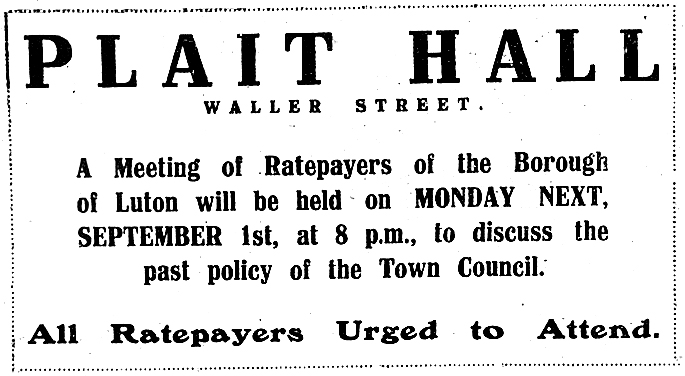
- Notice published in the Beds & Herts Saturday Telegraph on August 30th, 1919.
In December 1918, Britain had gone to the polls in a General Election. Despite women aged over 30 gaining the vote for the first time, the turn-out in Luton and South Beds was described as disappointingly quiet, but sitting MP Cecil Harmsworth saw his 613 majority as a Liberal MP at a 1911 by-election increased to 7,537 as a Lib-Con Coalition candidate. His 1918 opponent was Labour man Willet Ball.
But soon, as men were slowly demobilised and returned home from war to find little work, housing shortages and higher priced food, discontent grew. Throughout Britain there was unrest.
On Peace Day in Luton ex-servicemen vented their feelings about poor pensions, unemployment and other issues that were the Government's responsibility. But they were also not unnaturally aggrieved that locally the Town Council had vetoed the holding of a memorial service in Wardown Park for fallen comrades.
The inexplicable council decision - effectively made by a six-member hastily convened sub-committee of the Parks Committee and on the advice of Town Clerk William Smith – was condemned throughout the town as failing to show sympathy and tact. Even Lady Wernher's July 12th offer of the use of Luton Hoo Park for a memorial service that was eventually held there on July 27th, saw no abating in resentment against the Council, who many regarded as having created the potential for riot.
The simmering anger culminated in the Peace Day riots of the night of July 19th-20th that saw the burning down of the Town Hall and spilled over to a lesser extent over the next two nights. However, with strong police reinforcements on the streets, further trouble died out after July 21st, to such an extent that some imported police officers were even allowed to let their wives join them in Luton.
As with the Council's decision on the use of Wardown for a memorial service, the riots also produced widespread condemnation, including among ex-servicemen's groups.
On September 1st, a meeting of an estimated 1,000 Luton ratepayers was held at the Plait Hall in Waller Street. There, a resolution was passed: “That this meeting of ratepayers of Luton expresses its emphatic disapproval of the policy pursued of late by the Town Council as at present constituted, and consider the whole of the Council should come before the burgesses of the borough at the next November election for the purpose of ascertaining whether they do retain the confidence of the burgesses.”
So the scene was set for a possible showdown council election in November 1919 with the Labour Party and ex-servicemen joining the fight for seats...

